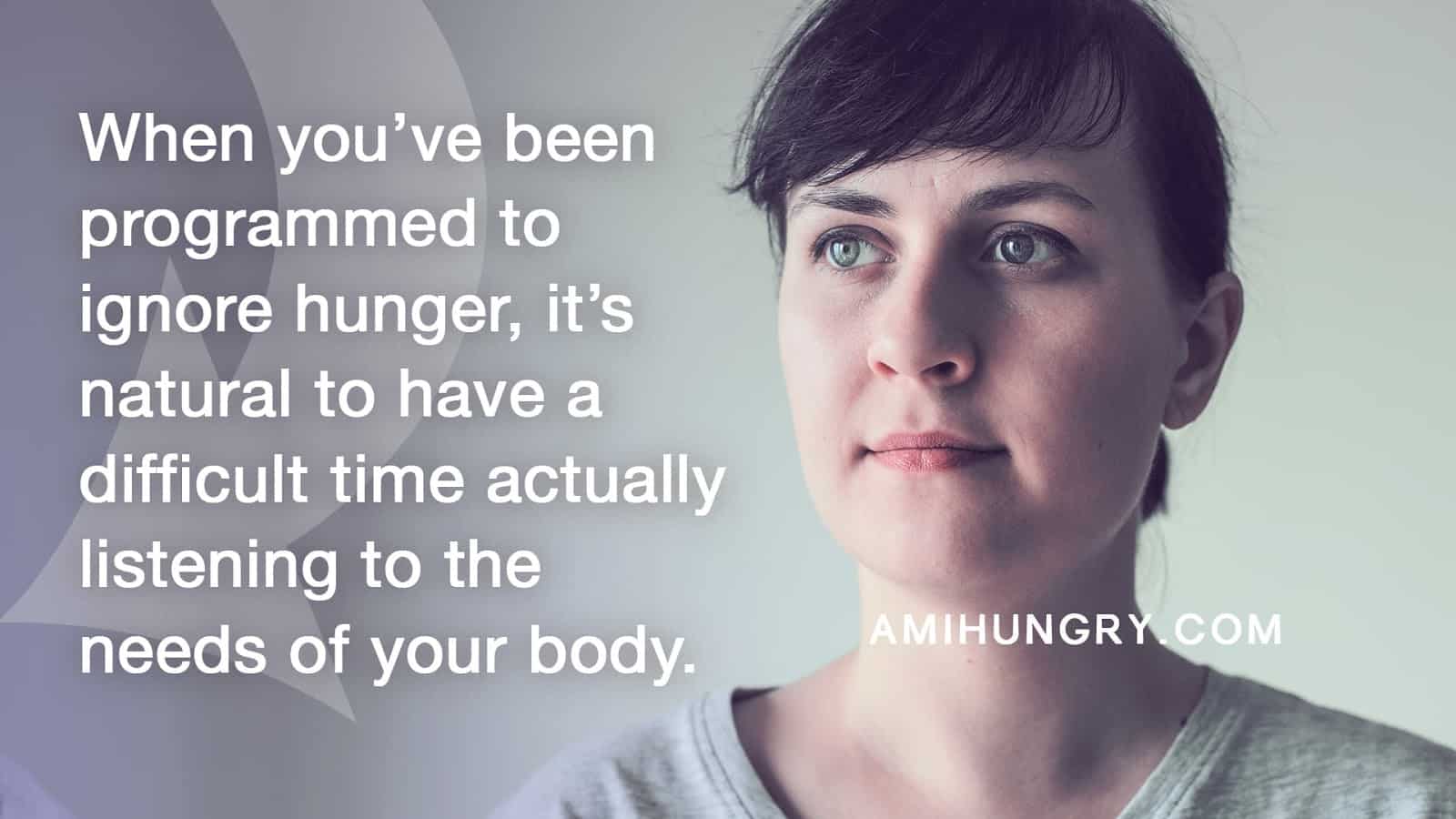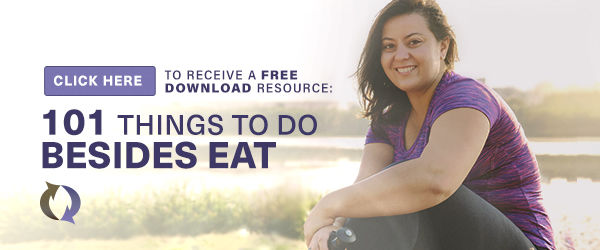Do you ever find yourself thinking, “I can’t tell if I’m hungry?” You feel like you want to eat something, but wonder, “Do I really need something to eat?”
Or maybe you think it’s time to eat, but you can’t tell if you are hungry.
First, give yourself credit for pausing to ask the question, “Am I hungry?” This is an essential first step (more on that below).
It’s easy to assume that when you think, “I should eat,” your body actually needs food.
By pausing to notice whether you are physically hungry, you’ve put yourself in a position to make a conscious decision about eating, and more important, about taking care of yourself.
Before I get to a 5-step mindful eating technique to help you tell if you are hungry, let’s look at the real question you might be asking…
Why can’t I tell if I’m hungry?
You are not alone! Every day I work with smart people who ask the same question.
Here’s one of the questions that came from one of our readers.
I am learning to eat mindfully, but one issue has been a big struggle for me: I can’t tell if I’m hungry. I constantly ask myself, “Am I hungry?” and rate myself on the Hunger and Fullness scale, but I never feel hungry—or I am missing the symptoms.
The only cues I get are when my blood sugar level drops and I feel lightheaded and shaky. If I only eat when I get severe symptoms, I am only eating twice a day and I feel tired and sluggish all the time.
I’ve spent the past 13 years eating on a schedule every 3-4 hours, never allowing myself to become hungry, but that just wasn’t working for me, either.
I can relate to the frustration this person is experiencing. Like many others who have been programmed to ignore hunger, her mind and her body are trying to make sense of her true needs.

How to know when you’re hungry
You might be tempted to be hard on yourself or blame yourself for not knowing whether you are hungry or bored, stressed, lonely, or any of dozens of other reasons you might feel like eating.
After years of ignoring hunger, it’s not surprising that it would take time to become attuned to the more subtle cues or signs and learn how to tell if you are hungry. The intention is to become more tuned in to what your body needs.
This 5-step mindful eating technique will help you experiment with your eating patterns to help you know when you’re hungry.
1. Ask, Am I hungry?
When you notice you want to eat, pause and ask, “Am I hungry?”
This simple break in your usual pattern of wanting to eat then automatically reaching for food is an essential first step to breaking old habits.
If you are unsure about the symptoms of hunger, check out a list of hunger symptoms here.
2. Do a Body-Mind-Heart Scan
While you’re relearning to connect with your body wisdom, practice a Body-Mind-Heart scan to help you tune into your physical sensations, thoughts, and feelings. I introduced this scan in my book, Eat What You Love, Love What You Eat ([thrive_2step id=’20172′]get the first chapter free here[/thrive_2step]).
If you are having difficulty identifying hunger until you are overly hungry (a high-risk time for overeating), practice a Body-Mind-Heart scan every 2 to 3 hours to see what you notice. While you’re relearning to connect with your body wisdom, you may find it challenging to remember to check in, so we have a Mindful Eating app, available here, that includes a helpful timer to remind yourself to perform your next scan.
The app also provides you with the instructions for what to do when the timer goes off.
After your scan, jot down whatever you notice in your Mindful Eating Program Awareness Journal—even if it seems unrelated.
You might discover there was a subtle symptom or two you didn’t realize was hunger. For example, I notice that I get irritable (hangry) and my upper abdomen starts to feel hollow when I’m hungry.
I would anticipate you may start to feel hungry about four hours after eating, depending on what and how much you ate.
The intention here is to tune into the symptoms of hunger before you begin feeling lightheaded and shaky.
If it’s been four or more hours since you last ate and you still don’t notice any symptoms of hunger, you may want to continue to check in with your body more frequently, perhaps every 30 to 60 minutes.
3. Become curious about your hunger rhythms
Besides being disconnected from the signals your body is giving you, there may be other reasons you don’t notice hunger as often.
For example, how much you are eating at prior meals will affect how often you feel hungry. Obviously, larger meals may delay hunger somewhat. If you are in a pattern of becoming overly hungry by the time you eat, you may be more likely to overeat—so you won’t get hungry as often.
Similarly, what you are eating may explain why you aren’t hungry as often. Some foods, like those that contain protein and/or fat, may lead to more sustained satiety than foods that primarily consist of carbohydrates.
My article, Hunger Doesn’t Follow a Clock, will help you use your awareness and curiosity to learn about your personal hunger rhythms and create a pattern of eating that works for you! (You can also learn more about hunger rhythms in chapter 5 of Eat What You Love, Love What You Eat—[thrive_2step id=’20172′]get the first chapter free here[/thrive_2step])
4. Use your ‘wise mind’ to help determine when you are hungry
If you still aren’t noticing hunger after trying these mindful eating techniques, use your “wise mind.”
For example, in the question from our reader above, she noticed she was getting tired and sluggish—both signs of significant hunger. This happens when you aren’t eating often enough to fuel your body.
So, if you still aren’t certain whether you are hungry even though it makes sense you’d be hungry (for example, within a couple hours after waking up), you could go ahead and have a small meal and notice whether you feel better.
As you become more mindful, you will develop your inner wisdom about how your body communicates its needs. Use your “wise mind” to make sense about how to care for yourself.
5. Practice mindfulness
Until you are able to recognize your symptoms of hunger, continue your regular Body-Mind-Heart scans to become more attuned to your body’s signals.
While experimenting with these mindful eating techniques, tune up your awareness by practicing nonjudgmental mindfulness in other situations and at other times. For example:
- As you shower, take time to mindfully feel the water on your skin.
- Listen to the ceiling fan or other background noises.
- Notice the seeds on a strawberry as you eat it.
With practice, noticing the subtle cues in and around you will become more natural!

Knowing when you’re hungry comes with practice
Don’t worry if you can’t tell if you are hungry or not at first!
Be gentle and kind to yourself. You’ve probably spent a great deal of your life programmed by the world around you to ignore your body. You CAN relearn to notice your instinctive cues of hunger and satiety.
With mindfulness and curiosity, awareness of hunger will soon feel natural again!
This article was previously published and has been updated.
Enjoyed this article? Here are 3 more of my popular articles related to hunger.
How to Overcome a Fear of Hunger
Hunger is the Best Seasoning
Making Sense of Your Eating Issues


